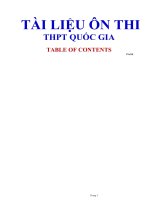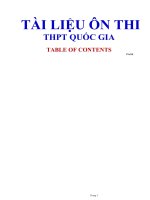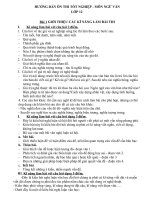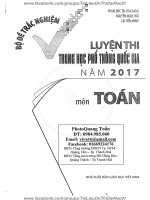30 chủ đề từ vựng ôn thi THPTQG TOPIC 8 PRESERVATION
Bạn đang xem bản rút gọn của tài liệu. Xem và tải ngay bản đầy đủ của tài liệu tại đây (105.6 KB, 10 trang )
TOPIC 8: PRESERVATION
I. VOCABULARY
STT
Từ loại
Phiên âm
Accelerate
v
/əkˈseləreɪt/
Agriculture
n
/ˈỉɡrɪkʌltʃə(r)/
nơng nghiệp
Industry
n
/ˈɪndəstri/
cơng nghiệp
Forestry
n
/ˈɪndəstri/
lâm nghiệp
3
Amphibian
n
/ỉmˈfɪbiən/
động vật lưỡng cư
4
Arguably
adv
/ˈɑːɡjuəbli/
có thể cho là
5
Barren
a
/ˈbỉrən/
6
Biosphere
n
/ˈbaɪəʊsfɪə(r)/
7
Canopy
n
/ˈkỉnəpi/
8
Consequently
adv
/ˈkɒnsɪkwəntli/
9
Consumption
n
/kənˈsʌmpʃn/
10
Curb
v
/kɜːb/
n
/ˌdiːˌfɒrɪˈsteɪʃn/
sự phá rừng
11
Deforestation
Reforestation
Afforestation
Forestation
n
/ˌriːfɒrɪˈsteɪʃn/
sự trồng lại rừng
n
/əˌfɒrɪˈsteɪʃn/
sự trồng rừng
n
/ fɒrɪˈsteɪʃn//
sự trồng cây gây rừng
12
Degradation
n
/ˌdeɡrəˈdeɪʃn/
sự mất giá, sự suy thối
13
Deliberate
a
/dɪˈlɪbərət/
14
Ecotourism
n
/ˈiːkəʊtʊərɪzəm/
du lịch sinh thái
15
Emission
n
/ɪˈmɪʃn/
sự phát ra, tỏa ra
n
/ɪnˌvaɪrənˈmentəlɪst/
16
Environmentalist
Environment
Environmental
n
/ɪnˌvaɪrənˈment/
mơi trường
a
/ɪnˌvaɪrənˈmentl/
thuộc mơi
1
2
17
Từ vựng
Nghĩa
đẩy nhanh, tăng tốc
cằn cỗi
sinh quyển
vịm, mái che, tán cây
do đó, bởi vậy
sự tiêu thụ
kiềm chế, nén lại, hãm lại
có cân nhắc, suy nghĩ kĩ lưỡng
chun gia mơi trường
Erosion
n
/ɪˈrəʊʒn/
trường
sự xói mịn
Erode
v
/ɪˈrəʊd/
xói mịn
18
Evidently
adv
/ˈevɪdəntli/
19
Excessive
a
/ɪkˈsesɪv/
20
Expenditure
n
/ɪkˈspendɪtʃə(r)/
sự tiêu dùng
Exploit
v
/ɪkˈsplɔɪt/
Exploitation
n
/ˌeksplɔɪˈteɪʃn/
khai thác
sự khai thác
22
Furrow
n
/ˈfʌrəʊ/
23
Indigenous
a
/ɪnˈdɪdʒənəs/
24
Indisputably
adv
/ˌɪndɪˈspjuːtəbli/
21
một cách hiển nhiên, rõ ràng
quá mức, thừa
luống cày
bản xứ, bản địa
hiển nhiên, không thể bàn cãi thêm
25
Integrity
n
/ɪnˈteɡrəti/
tính tồn vẹn, ngun vẹn
26
Ironic
a
/aɪˈrɒnɪk/
mỉa mai, châm biếm
27
Justification
n
/ˌdʒʌstɪfɪˈkeɪʃn/
28
Logging
n
/ˈlɒɡɪŋ/
việc đốn gỗ
29
Mammal
n
/ˈmỉml/
động vật có vú
30
Microbial
a
/maiˈkrəʊbiəl/
31
Moral
a
/ˈmɒrəl/
32
Perpetuate
v
/pəˈpetʃueɪt/
duy trì
33
Perspective
a
/pəˈspektɪv/
quan điểm
34
Porous
a
/ˈpɔːrəs/
rỗ, có nhiều lỗ rỗng
35
Potentially
adv
/pəˈtenʃəli/
một cách tiềm tàng
36
Primate
n
/ˈpraɪmeɪt/
linh trưởng
37
Ranching
n
/ˈrɑːntʃɪŋ
chăn ni gia súc
Regulate
v
/ˈreɡjuleɪt/
điều hịa, điều tiết
Regulation
n
/ˌreɡjuˈleɪʃn/
sự điều hịa, điều tiết
Reprocess
v
/riːˈprəʊses/
tái xử lí
Reclaim
v
/rɪˈkleɪm/
cải tạo
Recycle
v
/ˌriːˈsaɪkl/
tái chế
Reuse
v
/ˌriːˈjuːs/
tái sử dụng
Sewage
n
/ˈsuːɪdʒ/
chất thải (nước cống...)
Rubbish
n
/ˈrʌbɪʃ/
rác thải
Garbage
n
/ˈɡɑːbɪdʒ/
Litter
n
/ˈlɪtər/
rác vụn
Trash
n
/træʃ/
rác thải
41
Sluggish
a
/ˈslʌɡɪʃ/
42
Specifically
adv
/spəˈsɪfɪkli/
một cách cụ thể
43
Spongy
a
/ˈspʌndʒi/
như bọt biển, xốp, thấm nước
Stabilize
v
/ˈsteɪbəlaɪz/
Stable
a
/ˈsteɪbl/
Stability
n
/stəˈbɪləti/
45
Stink
v
/stɪŋk/
46
Susceptible
a
/səˈseptəbl/
dễ mắc phải, dễ tổn thương
47
Topsoil
n
/ˈtɒpsɔɪl/
lớp đất bề mặt, tầng đất mặt
48
Unequivocally
adv
/ˌʌnɪˈkwɪvəkəli/
49
Unobstructed
a
/ˌʌnəbˈstrʌkt/
38
39
40
44
sự bào chữa, sự biện bạch
thuộc vi trùng, vi khuẩn
có đạo đức
rác thải, phế liệu
lờ đờ, chậm chạp
làm ổn định
ổn định, vững chắc
sự ổn định
bốc mùi hôi thối
một cách rõ ràng, không mập mờ
không bị tắc nghẽn, không bị cản trở
50
Wasteful
/ˈweɪstfl/
a
lãng phí
II. STRUCTURES
STT
Cấu trúc
Nghĩa
1
A detailed action plan
bản chi tiết kế hoạch hành động
2
Allow/permit sb from doing st = let sb do st: cho phép ai làm gì
3
At risk of = in danger of
4
Be furious/angry with sb for st/doing st: tức giận với ai về cái gì/vì đã làm gì
5
Cooperate with
hợp tác với
6
Dispose of = get rid of
loại bỏ, xử lí
7
Import st from Export st to
nhập khẩu từ đâu xuất khẩu tới đâu
8
Kept out of
tránh xa
9
Live in harmony with = coexist peacefully with: chung sống hịa bình
10
Prefer to do st
thích làm gì hơn
11
Prevent sb from doing st
ngăn cản ai làm gì
12
Put pressure on sb/st
gây áp lực lên ai/cái gì
13
Take actions to do st
hành động làm gì
có nguy cơ, gặp nguy hiểm
III. PRACTICE EXERCISES
Exercise 1: Mark the letter A, B, C or D to indicate the word that differs from the other three in the
position of primary stress in each of the following questions.
Question 1: A. environment
B. ecology
C. sustainable
D. beneficial
Question 2: A. ecotourism
B. eliminate
C. preservative
D. variety
Question 3: A. damage
B. pollute
C. defense
D. erode
Question 4: A. medical
Question 5: A. conserve
B. pollutant
B. disease
C. imprison
C. wildlife
D. protective
D. expand
Exercise 2: Mark the letter A, B, C, or D indicate the word whose underlined part differs from the
other three in pronunciation in each of the following questions.
Question 6: A. conservation
B. preservation
C. combustion
D. erosion
Question 7: A. medicine
B. protect
C. species
D. develop
Question 8: A. variety
B. pattern
C. adapt
D. back
Question 9: A. pollution
Question 10: A. nature
B. coral
B. manage
C. problem
C. balance
D. ecology
D. campfire
Exercise 3: Mark the letter A, B, C, or D to indicate the correct answer to each of the following
questions.
Question 11: Environmentalists are furious with the American Government for delaying measures which
will reduce greenhouse gas
A. exhaust fumes
B. smokes
C. wastes
D. emissions
Question 12: The government is introducing strict new rules on the dumping of
A. pesticides
B. exhaust fumes
C. toxic waste
D. emissions
Question 13: If government don't
A. achieve
B. promote
by industry.
global warming, more natural disasters will occur.
C. discourage
D. prevent
Question 14: Environmental groups are putting
on governments to take actions to reduce the
amount of carbon dioxide which is given off by factories and power plants, thus attacking the problems at
its source.
A. force
B. pressure
C. persuasion
D. encouragement
Question 15: Some scientists,
believe that even if we stopped releasing carbon dioxide and
other gases into the atmosphere tomorrow, we would have to wait several hundred years to notice the
results.
A. but
B. although
C. despite
D. however
Question 16: The plants of a community are the producers: they use carbon dioxide, oxygen, nitrogen to
their tissues using energy in the form of sunlight.
A. build up
B. turn up
C. put up
D. hold up
Question 17: We should educate people to be fully aware of danger and join hands to
endangered species from becoming extinct.
A. protect
B. ban
C. escape
D. rescue
Question 18: The
A. preservative
biological diversity is being promoted by millions of supporters worldwide.
B. preservation
C. preserve
D. preserved
Question 19: When people can understand clearly the
impacts, they will be more aware of
conserving forests.
A. environment
B. environmental
C. environmentalist
D. environmentally
Question 20: In the
A. sustainable
agriculture, farmers try to limit the use of chemicals and fertilizers.
B. conserving
C. preserving
D. supporting
Question 21: Global warming is damaging the environment
this warning.
A. Consequently
B. Unequivocally
C. Evidently
, governments are trying to reduce
D. Indisputably
Question 22: Excessive logging of forests in the past century has resulted in
A. which it is known as deforestation
B. knowing this as deforestation
C. what becomes known as deforestation
D. that is known as deforestation
Question 23: Nature is a great
of useful materials.
A. produce
B. producer
C. productivity
D. product
Question 24: The council wants to
A. preserve
B. store
Question 25: In Singapore, people try to
A. reprocess
B. reclaim
Question 26: We need to act quickly to
.
thecharacter of the city while reconstructing the Old Quarter.
C. defense
D. abandon
80% of all waste.
C. recycle
D. reuse
toclimate change, or it will be a disaster for the whole
planet.
A. adapt
B. go back
C. reverse
Question 27: The city council is discussing a detailed
parks.
A. activity
B. action
C. measure
Question 28: To
further generation.
A. go
D. transit
plan for maintaining clean beaches and
D. approach
green is to practice simple green lifestyles, which helps save the planet for
B. act
C. make
D. get
Question 29: It is advisable that people start using
products.
A. environment-friendly
B. friend-of-environment
C. friendly to environment
D. friendly environmentally
Question 30: People should
A. adapt
B. adjust
a green lifestyle to help conserve the natural resources.
c. adopt
D. adjoin
Question 31: Environmentalists are worried that our natural resources will
initiative to go green.
A. run
B. deplete
C. deprive
D. end
if we don't take
Question 32: People should use bicycles instead of motorbikes
fumes and pollution.
A. unless
B. although
C. since
it will help to reduce exhaust
D. while
Question 33: We reuse bags, old clothing and scrap paper at home
A. lest
B. in order to
C. for fear of
we can reduce waste.
D. so that
Question 34: The local university has recently
to students several ways to go green, which has
had huge impact on the community.
A. introduced
B. enacted
C. passed
D. enforced
Question 35: Sometimes people just focus on the
benefits without thinking of the environmental
risks of certain economic activities.
A. long-term
B. short-lived
C. immediate
D. potential
Question 36: The raw sewage needs to be
A. chemically
B. chemical
treated.
C. chemist
Question 37: There are more than 20
working on the water treatment project.
A. researches
C. researchers
B. researcher
D. chemistry
D. research
Question 38: Many people
that natural resources will never be used up.
A. view
B. consider
C. believe
D. regard
Question 39: Conservation is the protection of the
environment.
A. nature
B. natural
C. naturally
D. naturalize
Question 40: The NatureServe Network empowers people to sustain
by making sure everyone
has access to the knowledge of our shared lands and waters.
A. diverse
B. biodiverse
C. diversification
D. biodiversity
Exercise 4: Mark the letter A, B, C, or D on your answer sheet to indicate the word(s) CLOSEST in
meaning to the underlined word(s) in each of the following questions.
Question 41: Moral justification has been extended by a movement called "deep ecology" the members
of which rank the biosphere higher than people because the continuation of life depends on this larger
perspective.
A. event
B. view
C. ideal
D. truth
Question 42: A sustainable forest is a forest where trees that are cut are replanted and the wildlife is
protected.
A. pre-tested
B. preserved
C. reserved
D. protested
Question 43: I am very much interested in learning more about ecotourism and its benefits.
A. problems
B. advantages
C. dangers
D. issues
Question 44: Ecotourism means travel to areas of natural or ecological interest to observe wildlife and
learn about the environment.
A. look at
B. look up
C. look into
D. look down
Question 45: Conservation conflicts arise when natural-resource shortages develop in the face of steadily
increasing demands from a growing human population.
A. stand up
B. sit up
C. get up
D. spring up
Question 46: We are facing severe environmental pollution despite the fact that many world
organizations are working hard to reduce it.
A. heavy
B. destructive
C. harmful
D. serious
Question 47: Stop the degradation of the planet's natural environment and build a future in which humans
live in harmony with nature.
A. coexist peacefully with
B. fall in love with
C. agree with
D. cooperate with
Question 48: WWF was set up in 1961 and had its operations in areas such as the preservation of
biological diversity.
A. difference
B. abundance
C. variety
D. plenty
Question 49: Some of WWF's missions are: conserving the world’s biological diversity ensuring the use
of renewable natural resources, and promoting the reduction of pollution.
A. jobs
B. careers
C. tasks
D. actions
Question 50: One of the main aims of this organization is the sustainable use of natural resources.
A. maintainable
B. forgettable
C. visible
D. vegetable
Question 51: For environmental safety, we need to find ways to reduce emission of fumes and smoke of
factories.
A. leak
B. release
C. poison
D. pollutant
Question 52: After years of starts, the shift to clean power has begun to accelerate at a pace that has
taken the most experienced experts by surprise.
A. change
B. exchange
C. convert
D. transfer
Question 53: Renewable sources of energy should be used since natural resources are being exploited at
an alarming rate.
A. rapid
B. slow
C. worried
D. tiring
Question 54: Some citizens believe that protecting the environment is the responsibility of the
government and organizations; therefore, they don't have to take any actions.
A. obligation
B. mission
C. volunteer
D. service
Question 55: We should focus on the conservation of vulnerable species at risk of disappearing.
A. concentrate on
B. rely on
C. believe in
D. depend on
Exercise 5: Mark the letter A, B, C, or D on your answer sheet to indicate the word(s) OPPOSITE
in meaning to the underlined word(s) in each of the following questions.
Question 56: One way to protect our environment from pollution is to reduce wasteful consumption.
A. costly
B. excessive
C. safe
D. economical
Question 57: If you follow at least one of the tips, you can be proud of taking part in the preservation of
water, one of the very important and limited natural resources on earth.
A. self-confident
B. self-satisfied
C. discontent
D. unpleasant
Question 58: For the sake of environment and for the people who live in it, we must eliminate pollution
immediately.
A. remove
B. conserve
C. process
D. possess
Question 59: An aesthetic justification contends that biodiversity contributes to the quality of life
because many of the endangered plants and animals are particularly appreciated for their unique physical
beauty.
A. argues
B. encounters
C. abandons
D. disputes
Question 60: Scientists are experimenting on ways to dispose of waste safely.
A. get rid of
B. put aside
C. deal with
D. get used to
Question 61: The shift has come as increased government efforts to curb climate change and smog have
driven down costs and spurred technical advances, creating a green energy industry that looks nothing
like it did a decade ago: expensive and sluggish.
A. inactive
B. developed
C. promising
D. ineffective
Question 62: People know that categorizing trash helps to recycle waste and protect the environment, but
they are not willing to do it.
A. reluctant
B. hesitant
C. ready
D. pleasant
Question 63: As the government initiated a program to improve the water quality of the Nhieu Loc
Canal years ago, it doesn't stink any more.
A. completed
B. launched
C. commenced
D. stroke
Question 64: Today, illegal hunting still threatens many species, especially large mammals such as
tigers, rhinoceros, bears and even primates.
A. allowed by law
B. forbidden by law
C. introducing a law
D. imposing a law
Question 65: Let’s clear up this rubbish and put it in the bin.
A. mess up
B. clear away
C. tidy
D. clear off
Question 66: Recycling and disposal of wastes require sizable expenditure. In such situations, industries
preferred to export their wastes to other countries.
A. considerable
B. plentiful
C. trivial
D. minimum
Question
: The United Nations has declared the celebration of the International Day of
Ecotourism, to promote sustainable practices in this growing industry.
A. favor
B. raise
C. boost
D. delay
Question 68: All visitors are kept out of the conservation area.
A. prevented from entering
B. prevented from destroying
C. allowed to enter
D. allowed to take photos
Question 69: It is urgent that these governments work out a solution to the problem that they are all
facing.
A. keep secret
B. find
C. share
D. arrive at
Question 70: In order to protect endangered species, it is important that all people join in.
A. participate
B. ignore
C. take part
D. enjoy
Exercise 6: Read the following passage and mark the letter A, B, C, or D on your answer sheet to
indicate the correct word or phrase that best fits each of the numbered blanks from 71 to 75.
Trees protect the soil beneath them; thus, tree loss can affect soil integrity. For example, the rain forest
floor, home to myriad plant life as well as insects, worms, reptiles and amphibians, and small mammals,
relies on a dense canopy of branches and leaves to keep it healthy and intact. The canopy prevents surface
runoff by (71)
heavy rainfall so that water can drip down slowly onto the porous earth. Tree
roots also stabilize the soil and help prevent erosion. (72)
a healthy soil encourages root
development and microbial activity, (73)
contribute to tree growth and well-being. A major
factor in logging-related soil damage comes from road building, with trucks and other heavy equipment
compressing the spongy soil, creating furrows where water collects, and disrupting the underground water
flow. Eventually, the topsoil wears away, leaving behind an (74)
layer of rocks and hard clay.
Logging can also damage aquatic habitats. Vegetation along rivers and stream banks helps maintain a
steady water flow by blocking the entry of soil and other residue, and trees shade inhibits the growth of
algae. Removing trees (75)
these benefits. When eroding soil flows into waterways, the organic
matter within it consumes more oxygen, which can lead to oxygen depletion in the water, killing fish and
other aquatic wildlife.
(Adapted from Essential words for the IELTS by Dr. Lin Lougheed)
Question 71: A. cutting off
B. putting out
C. getting rid of
D. cutting down on
Question 72: A. In exchange
B. Instead of
C. On the whole
D. In general
Question 73: A. that
B. what
C. which
D. who
Question 74: A. fertile
Question 75: A. had obliterated
B. sterile
B. is obliterating
C. nutrient
C. has obliterated
D. bountiful
D. obliterates
Exercise 7: Read the following passage and mark the letter A, B, C, or D on your answer sheet to
indicate the correct answer to each of the questions from 76 to 83.
Deforestation is the clearing, destroying, or otherwise removal of trees through deliberate, natural or
accidental means. It can occur in any area densely populated by trees and other plant life, but the majority
of it is currently happening in the Amazon rainforest. The loss of trees and other vegetation can cause
climate change, desertification, soil erosion, fewer crops, flooding, increased greenhouse gases in the
atmosphere, and a host of problems for indigenous people.
Deforestation occurs for a number of reasons, including: farming, mostly cattle due to its quick turn
around; and logging for materials and development. It has been happening for thousands of years,
arguably since man began converting from hunter/gatherer to agricultural based societies, and required
larger, unobstructed tracks of land to accommodate cattle, crops, and housing. It was only after the onset
of the modern era that it became an epidemic.
One of the most dangerous and unsettling effects of deforestation is the loss of animal and plant species
due to their loss of habitat; not only do we lose those known to US, but also those unknown, potentially
an even greater loss. Seventy percent of Earth’s land animals and plants live in forests, and many cannot
survive the deforestation that destroys their homes. The trees of the rainforest that provide shelter for
some species also provide the canopy that regulates the temperature, a necessity for many others. Its
removal through deforestation would allow a more drastic temperature variation from day to night, much
like a desert, which could prove fatal for current inhabitants.
In addition to the loss of habitat, the lack of trees also allows a greater amount of greenhouse gases to be
released into the atmosphere. Presently, the tropical rainforests of South America are responsible for 20%
of Earth's oxygen and they are disappearing at a rate of 4 hectares a decade. If these rates are not stopped
and reversed, the consequences will become even more severe.
The trees also help control the level of water in the atmosphere by helping to regulate the water cycle.
With fewer trees left, due to deforestation, there is less water in the air to be returned to the soil. In turn,
this causes dryer soil and the inability to grow crops, an ironic twist when considered against the fact that
80% of deforestation comes from small-scale agriculture and cattle ranching.
Further effects of deforestation include soil erosion and coastal flooding. In addition to their previously
mentioned roles, trees also function to retain water and topsoil, which provides the rich nutrients to
sustain additional forest life. Without them, the soil erodes and washes away, causing farmers to move on
and perpetuate the cycle. The barren land which is left behind in the wake of these unsustainable
agricultural practices is then more susceptible to flooding, specifically in coastal regions. Coastal
vegetation lessens the impact of waves and winds associated with a storm surge. Without this vegetation,
coastal villages are susceptible to damaging floods.
(Source: />Question 76: What does the passage mainly discuss?
A. The definition of deforestation.
B. The negative impacts of deforestation.
C. The reasons why deforestation occurs frequently.
D. The effective solutions to solve the deforestation all over the world.
Question 77: The word “indigenous" in the first paragraph probably means
A. foreign
B. agrarian
C. native
D. mountainous
Question 78: Which of the following is NOT stated as the reason of deforestation in paragraph 2?
A. cutting trees for wood
B. ranching cattle
C. cultivating
D. hunting for food.
Question 79: What does the word “others" in the third paragraph refer?
A. canopy
B. species
C. rainforest
D. trees
Question 80: The following are negative effects of deforestation, EXCEPT
A. Myriad flora and fauna species have been eradicated before we discover them.
B. The alteration of temperature in a complete day is becoming more radical due to the loss of trees.
C. The soil is infertile to grow crops because of the shortage of rain and erosion.
D. More and more animals have to find a place of refuge under the canopy of leaves.
Question 81: The word "perpetuate" in the last paragraph is closest in meaning to
A. maintain
B. stop
C. prevent
D. start
Question 82: Coastal regions are mentioned in the last paragraph as an example of regions that
A. are easy to be vulnerable in a storm surge.
B. are left behind because of the reduction of forests.
C. are not much influenced by flood.
D. often experience droughts or erosion.
Question 83: The paragraph following the last paragraph in the passage may probably discuss
A. a number of disadvantages that deforestation puts local people at.
B. some drastic measures that should be taken to deal with deforestation.
C. the reality of deforestation in some specific countries.
D. some scientists' perspectives about deforestation.









